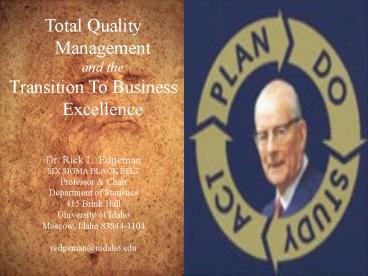Total Quality Management and the - PowerPoint PPT Presentation
1 / 19
Title:
Total Quality Management and the
Description:
415 Brink Hall. University of Idaho. Moscow, Idaho 83844-1104. redgeman_at_uidaho.edu ... everything must be geared towards customer satisfaction, the engine which drives ... – PowerPoint PPT presentation
Number of Views:122
Avg rating:3.0/5.0
Title: Total Quality Management and the
1
Total Quality Managementand the Transition To
Business Excellence Dr. Rick L. Edgeman SIX
SIGMA BLACK BELT Professor Chair Department of
Statistics 415 Brink Hall University of
Idaho Moscow, Idaho 83844-1104 redgeman_at_uidaho.ed
u
2
The Prime Directive of Total Quality
Management and its Culture?
The TQM philosophy derives from one foundational
idea everything must be geared towards
customer satisfaction, the engine which drives
the company and on which its future survival
depends.
3
Total Quality Management (TQM) can be seen as a
continuously evolved management system,
consisting of values, methodologies and tools.
The aim of the system is to increase external and
internal customer satisfaction with a reduced
amount of resources. It is important to note,
that the techniques and tools in the figure are
just examples and not a complete list. In the
same way the values may also vary a little
between different organisations and over time.
(From Hellsten Klefsjö, 2000.)
4
What is Quality?
Continuous Satisfaction of Customer Requirements
A Customer-Centric View
5
What isQuality Management?Achievement of
Quality at Low Cost.
6
What isTotal QualityManagement?Attainment
ofTotal QualityThrough EveryonesCommitment on
a Daily Basis
7
SO .. Quality is a state in which value
entitlement is realized for the customer and
provider in every aspect of the business
relationship. Business quality is highest when
the costs are at the absolute lowest for both the
producer consumer and is most readily attained
when the entirety of the organizations human
resource is engaged..
8
Anything Else is Just a Killer
Renaults Five Principles of a New Culture
9
Fundamentally, organizational culture can be
thought of as the way we do things around here.
10
The Customer is the Ultimate Judge of Value The
Search for a Lean Approach Controlling the
Process Means Reducing Dispersion Involving
Empowering People The Spiral of Continuous
Improvement
Quality Culture Principles
11
The TQM Culture
Listening to the Customer
Quality
Customer Satisfaction
People
Processes
Reducing Waste
Cost
Progress Through S-PDSA
Delivery
More Value for the Customer
12
In the Spirit of Continuous Improvement
Business
EXCELLENCE
Organizational
Performance
What is the Next Turn in the Revolution?
13
Business Excellence is
an overall way of working that balances
stakeholder interests and increases the
likelihood of sustainable competitive
advantage and hence long-term organizational
success through operational, customer-related,
financial and marketplace performance
excellence. Edgeman, Dahlgaard, Dahlgaard
Scherer, 1999
14
An Aligned Approach to Organizational Performance
Management That Results In
PERFORMANCE EXCELLENCE
Harry Hertz 15 Sept. 2000
- Delivery of Ever-Improving Value to Customers,
Resulting in Marketplace Success - Improving Organizational Effectiveness and
Capabilities and - Organizational and Personal Learning.
15
Organizational Self-Assessment
The comprehensive, systematic, and regular review
of an organizations activities and results
against a specified model. Purpose Identification
of strengths, weaknesses and opportunities for
improvement.
The Principal Use of Excellence Models
16
Business Excellence Principles
- Leadership Constancy of Purpose
- Customer Focus
- Results Orientation
- Management by Processes Facts
- People Development Involvement
- Continuous Learning, Innovation Improvement
- Partnership Development
- Public Responsibility
17
European Quality Award Excellence
Criteria People Processes Leadership Policy
Strategy Key Performance Results Partnerships
Resources Customer Results Society Results People
Results
18
Input Transform
Output
Inform
Renewal
Assessment Review
The EQA Excellence Model as an Input-Transform-Out
put-Inform Model
19
Leadership
Balanced Stakeholder- Driven Master Plan
Communication
Resources
Partnerships
People
Policy Strategy
Processes
Society
Sustainable Competitive Advantage
People
Results Orientation
Performance
Customer
From TQM to Business Excellence































